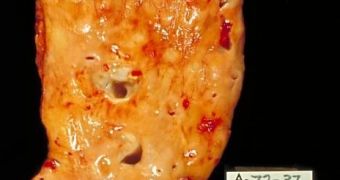Cholesterol may be dangerous, but it also has its good variant in the blood that decreases the risk of heart attack. If a new research made on mice has results that are also valid for humans, new therapies could boost the levels of the beneficial high-density lipoprotein cholesterol (HDL-C) as a means of heart protection.
"By and large, the medicines now available lower levels of the 'bad' low-density lipoprotein cholesterol [LDL-C]. There is a great need for methods to raise good cholesterol levels. Our findings suggest there may be multiple places to interrupt the metabolism of HDL-C," said Weijun Jin of the University of Pennsylvania School of Medicine.
LDL-C accumulates in blood vessel walls, increasing blood pressure and the risk of stroke. Oppositely, HDL-C cleans the arteries of cholesterol, which is carried to the liver, a process named reverse cholesterol transport, where it is metabolized and then expelled from the body.
"Existing LDL-C-lowering drugs such as statins can reduce the risk of heart attack by 20 to 35 %. However, treatment methods that would simultaneously lower bad cholesterol and increase good cholesterol have the potential to work even better. Indeed, researchers believe that increasing HDL-C while lowering LDL-C might cut heart attack risk by as much as 70 %," said Jin.
The research team showed that treatments that partially stop the activity of liver enzymes called proprotein convertases lowered plasma HDL-C levels in mice. The metabolic effect of the proprotein convertases was also linked on another enzyme, endothelial lipase (EL), which destroys HDL-C. Proprotein convertases normally decrease the EL function. The inhibition of the proprotein convertase resulted in a higher activity of EL and a drop in HDL-C. But higher activity of proprotein convertases in the liver meant a great increase of protective HDL-C. "Proprotein convertases are an unexpected new player in HDL-C metabolism. By manipulating levels of the enzyme in both directions, we were able to reduce HDL-C to almost nothing or double it.", Jin explained.
This means that it would be "theoretically possible to manipulate good cholesterol levels to whatever point you like. Further investigation will examine to what extent the pathway is preserved in humans," he added.
The team is going to look for drugs capable of boosting good-cholesterol levels.

 14 DAY TRIAL //
14 DAY TRIAL //